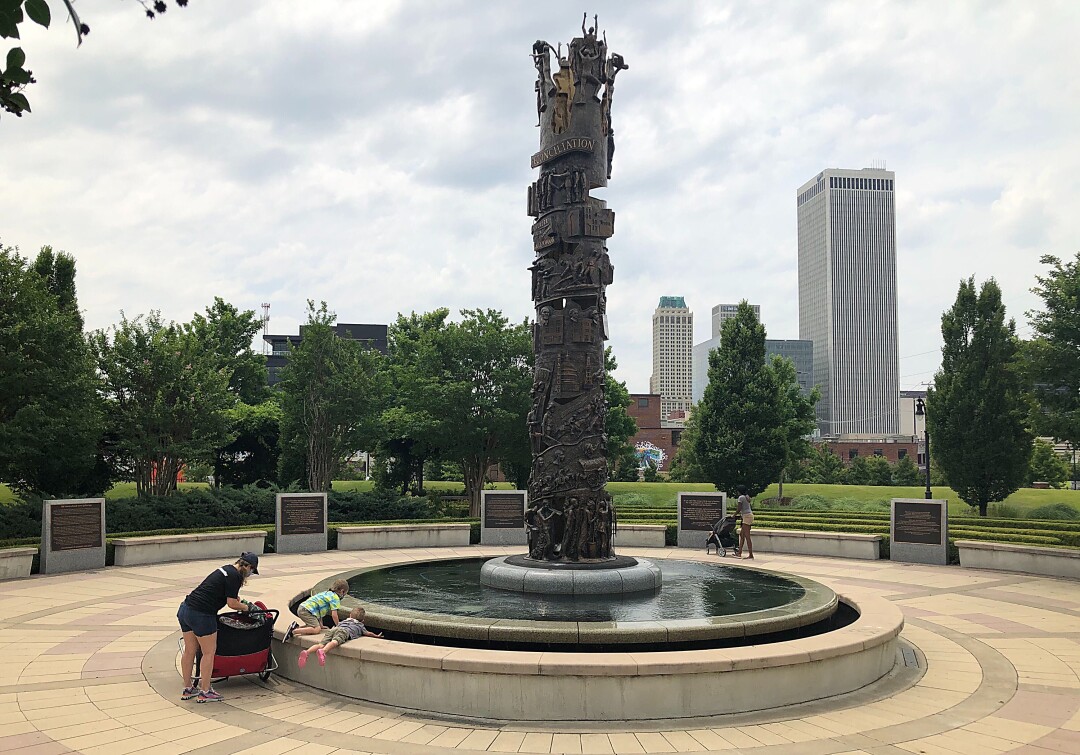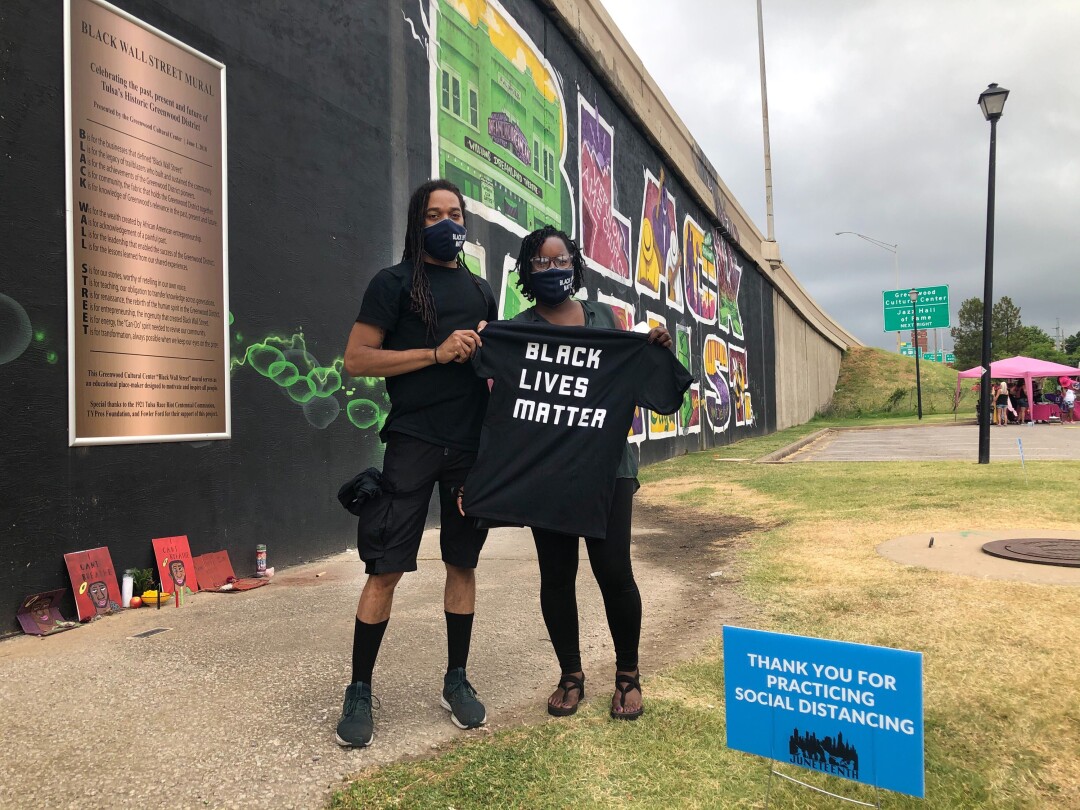On a day that marked the emancipation of slaves, in a time of racial pain and widening pandemic, crowds descended in the Greenwood District to celebrate Juneteenth and lay to rest past injustices even as new ones gathered across a troubled and divided nation.
Juneteenth has been remembered here for generations, recalling not just the freeing of enslaved ancestors in Texas in 1865, but also Greenwood’s resurrection after a 1921 massacre by white mobs and National Guard troops that killed hundreds and razed what was known as “Black Wall Street.”
That’s part of the story visitors learned Friday walking past brass plaques embedded in the sidewalk to commemorate businesses ravaged in the massacre. “We were Oklahomans before there was an Oklahoma,” said Reuben Gant, 68, who served on the commission that built the neighborhood’s John Hope Franklin Reconciliation Park, named after a Black Oklahoma historian.
Gant has led tours of small groups wearing masks during the pandemic. But these days are different, etched with deepening anxiety over race and politics in the aftermath of the death last month of George Floyd and fears that Saturday’s rally in Tulsa by President Trump and thousands of his supporters will turn violent.
The park was full of visitors Friday, even as rain fell early in the day. A white mother wearing a Black Lives Matter T-shirt brought her children to examine educational plaques on the park’s “Healing Walkway” surrounding the 25-foot bronze Tower of Reconciliation sculpture. A Black mother read the plaques to her 2-year-old son.
Advertisement
Advertisement
“When the Old West was new, you found us everywhere,” one of the plaques said. “…Out of grit and hard work, brick and mortar, we built our own piece of the American Dream. We called it Greenwood.”
Teshayla Bell, 23, a Tulsa native, said she brought her son Jaylon Tarbell to the park to celebrate Juneteenth — a celebration of the day enslaved Black people in Texas received word of emancipation in 1865 — for the first time, “just to be closer to my history.”

Teshayla Bell, 23, a Tulsa, Okla., native, said she brought her 2 year-old son Jaylon Tarbell to John Hope Franklin Reconciliation Park to celebrate Juneteenth for the first time, “just to be closer to my history.”
(Molly Hennessy-Fiske / Los Angeles Times)
It was in Greenwood that white lynch mobs descended 99 years ago, angered by rumors that a young Black man had stumbled into a white female elevator operator. Attackers were deputized and given weapons, even using planes to drop makeshift bombs. More than a thousand homes were destroyed. Officials only reported that three dozen Black residents were killed, but researchers are still investigating mass graves they suspect hold the remains of hundreds.
This year, the city’s annual Juneteenth festival was politically charged. The Rev. Al Sharpton was in town and scheduled to address the crowd. Organizers painted Greenwood Avenue with a bright yellow message: “Black Lives Matter.” Vendors brought T-shirts listing now-iconic names of unarmed Black people who died at the hands of police: Michael Brown, Sandra Bland, Terence Crutcher, Breonna Taylor and George Floyd.
Businesses and a local church hired added security, concerned they might be targeted by those arriving for Trump’s first campaign rally Saturday. Many in the crowd wore masks and socially distanced, concerned about COVID-19. Such scenes were a testament to America and its disturbing past and restive present, a nation caught between civil rights chants, “Make America Great Again” hats and a virus that has killed about 120,000.
Advertisement
“Juneteenth is so important because it’s a culture we didn’t learn about in our textbooks,” said Nathaniel Monk, 37, of Tulsa who attended with his family despite concerns about the coronavirus and potential attacks. “The fact that everyone’s out here braving it shows how important it is. People are tired enough to brave the storms.”
Monk and his wife were distributing free water and snacks and asking people to sign a unity pledge. Kristal Monk, 35, an epidemiologist, said she was afraid to attend this year because of the medical risks — virus infections have surged in recent days in Oklahoma — and also because of recent police brutality.
“I came to show my kids it’s important; we need to make a change,” she said as her two daughters played nearby after getting their faces painted.
Shcarry Chatmon, a Tulsa native, brought her boyfriend Asher Riley to tour Greenwood for the first time after he moved to the area from Philadelphia a month ago. They walked past the Black Wall Street mural, pausing to examine a small memorial to Floyd. Both wore “Black Lives Matter” masks.
“It’s brilliant to see everyone here, standing up for what’s right and our Blackness,” said Riley, 30, who works at a local restaurant.
Chatmon, 32, a physician, said the crowd was more diverse than ever, but the atmosphere also felt more charged. “I’m hoping everyone behaves tomorrow at the Trump rally,” she said. “We have had such a history of violence against us.”

Shcarry Chatmon, 32, a Tulsa, Okla., native, brought her boyfriend Asher Riley, 30, to tour the city’s historically Black Greenwood District on Juneteenth.
(Molly Hennessy-Fiske / Los Angeles Times)
Some Greenwood groups sought a court injunction to stop the rally due to public health risks, but their request was rejected Friday by a judge and on appeal by the Oklahoma Supreme Court. Trump won all of Oklahoma’s 77 counties in the 2016 election.
Several Trump counter-protests were planned Saturday, but it wasn’t clear how city officials and police planned to respond. Late Thursday, Tulsa Mayor G.T. Bynum, a Republican Trump supporter, imposed a 10 p.m. curfew around the arena where the president was scheduled to appear.
But on Friday, Trump tweeted that he had spoken with Bynum and that the curfew would not apply to those attending his rally. “There will be no curfew tonight or tomorrow for our many supporters attending the #MAGA Rally. Enjoy yourselves - thank you to Mayor Bynum!” Trump wrote.
Advertisement
Soon after, Bynum said he had imposed the curfew at the request of the Tulsa police chief and the Secret Service, which on Friday asked that the curfew be lifted.
“We were told the curfew is no longer necessary so I am rescinding it,” Bynum said in a statement. Tulsa police were working with the Secret Service to create a zone to keep the area “clear of individuals that are only present to break the law and disrupt the rights of people assembling peacefully.”
The vice chair of Tulsa’s City Council, Vanessa Hall-Harper, was upset to see the mayor back down on the curfew, which she said might prevent street clashes between rally attendees and protesters.
“I’ve been deeply concerned about this from the very beginning,” Hall-Harper, whose husband is a police officer and president of the city’s Black Officers Coalition.
Trump’s comments came a day after he tweeted that, “Any protesters, anarchists, agitators, looters or lowlifes who are going to Oklahoma please understand, you will not be treated like you have been in New York, Seattle, or Minneapolis. It will be a much different scene!”
“I’m a little puzzled when I hear people walking around talking about ‘Make America Great Again,’” Sharpton told a crowd of several hundred people Friday. “It wasn’t great for slaves and Jim Crow, fighting for the right to vote.”
Sharpton, who said he had received threats before coming to Tulsa, called on the president to stop condemning protesters and instead, “Look over here in Greenwood tonight: This is what makes America great.”
Sharpton was introduced by Tiffany Crutcher, 40, of Tulsa whose twin brother Terence Crutcher was fatally shot in 2016 by a white police officer who was later acquitted and is still working in law enforcement. “Our hurt is serving a purpose,” Crutcher told those gathered.
Chatmon and Riley live near downtown. They hadn’t decided Friday whether to attend protests, stay home or somewhere else.
“I just want to be safe,” Chatmon said.
U.S. - Latest - Google News
June 20, 2020 at 06:56AM
https://ift.tt/3hNzerA
A Tulsa on edge celebrates Juneteenth on eve of Trump rally - Los Angeles Times
U.S. - Latest - Google News
https://ift.tt/2ShjtvN
Shoes Man Tutorial
Pos News Update
Meme Update
Korean Entertainment News
Japan News Update
Bagikan Berita Ini















0 Response to "A Tulsa on edge celebrates Juneteenth on eve of Trump rally - Los Angeles Times"
Post a Comment